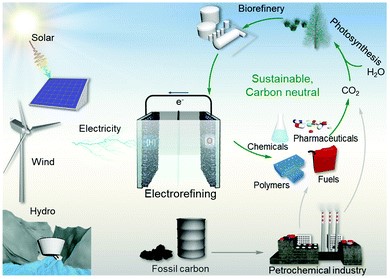37. Recent advances on non-noble electrocatalysts for oxidative valorization of biomass derivatives
Ge, R.,Li, J.,Duan, H.*
Science China Materials 2022.
DOI: 10.1007/s40843-022-2076-y
Abstract
Electrocatalysis is deemed as a promising approach for sustainable energy conversion and chemical production. Although a variety of cathode reactions (e.g., hydrogen evolution and CO2/N2 reduction) produce valuable fuels and chemicals, the extensively studied oxygen evolution reaction (OER) at anode only generates O2, which is not a high-value product. Substituting the OER with thermodynamically more favorable biomass derivative oxidation reactions (BDORs) not only enables energy-saving electrocatalysis, but also provides value-added anode products. Recent achievements have demonstrated that non-noble electrocatalysts are promising for BDORs. Herein, we provide a comprehensive review on recent achievements in the field of electrochemical BDORs catalyzed by non-noble catalysts. We start by summarizing the electrocatalytic oxidation of different types of biomass-derived substrates, aiming to show the advantages of the electrocatalytic pathway and to introduce the state-of-the-art non-noble catalysts. The reaction mechanisms of non-noble-material-catalyzed BDORs are then summarized and classified into three types according to the acceptor of hydrogen species during the dehydrogenation of biomass derivatives. Subsequently, discussions are devoted to the strategies for promoting the performances of non-noble electrocatalysts. Finally, we propose our opinions regarding future trends and major challenges in this field.


